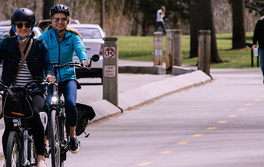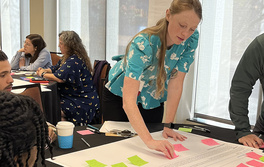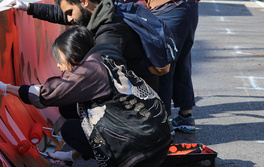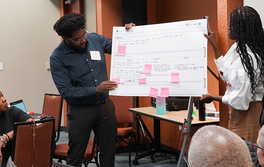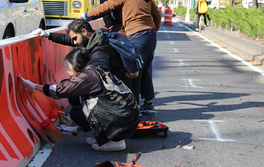
RELEASE: 15 Communities Selected for Inaugural Community Connectors Program
15 Communities Selected for Inaugural Community Connectors Program
The Community Connectors program offers technical support and funding for communities working to repair the damage of divisive infrastructure in effort to reconnect communities
Washington, D.C. (September 13, 2023) — Smart Growth America has selected 15 community-focused projects to participate in the new Community Connectors program which aims to repair the damage of divisive infrastructure in small and mid-sized cities. Divisive infrastructure presents a barrier to safe transportation and economic opportunity, particularly for communities that have been historically marginalized.
The new Community Connectors program is supported by the Robert Wood Johnson Foundation and conducted in partnership with Equitable Cities, the New Urban Mobility Alliance, and America Walks.
“These locally-led projects aim to remove divisive transportation infrastructure that has too long created barriers to access and economic opportunity,” said Beth Osborne, Vice President of Transportation and Thriving Communities at Smart Growth America. “The Community Connectors program will accelerate these communities’ efforts by supporting strong community-based partnerships, providing capacity building grants, and offering technical assistance from national transportation leaders through workshops and direct support to advance their projects’ goals.”
The 15 selected projects include (full project descriptions and lead organizations below):
- Albany, NY | Together We Can: Repairing the Damage of Interstate 787
- Appleton, WI | Redesigning College Avenue Corridor
- Buffalo, NY | Building a Better Bailey Avenue with Bus Rapid Transit
- Cleveland, TN | Putting East Inman Street Back Together
- Durham, NC | Seeking Transit Solutions for Black Communities in Durham
- East Orange and Orange, NJ | Remedying the Problem of Interstate 280 and Freeway Drive
- Flint, MI | A Community Vision for the Interstate 475 Corridor
- Harrisonburg, VA | Reconnecting Harrisonburg’s Northeast Neighborhood to Downtown
- Jefferson Parish, LA | Realigning On-Street Rail Crossings in Jefferson Parish
- Macon, GA | Reconnecting Pleasant Hill to Downtown Macon
- Minneapolis, MN | Bring Back 6th! Transforming Olsson Memorial Highway
- National City, CA | The National City Southeast Greenspace Corridor Project
- Saint Louis, MO | Connecting Historically Underserved Neighborhoods to Arts & Business Districts
- Spokane, WA | Addressing the Harms of Interstate 90
- Trenton, NJ | Reconnecting to the River: Converting Route 29 into a Boulevard

These projects will receive grants of up to $130,000 to build local capacity to co-design projects alongside impacted communities to advance new transportation infrastructure projects that repair damage from divisive infrastructure. The Community Connectors program will take place over the next two years and features a learning exchange this November in Atlanta, GA and links local leaders to experts and other cities attempting to accomplish similar objectives in reconnecting communities.
“We are thrilled to welcome 15 exceptional teams to the Community Connectors program, a transformative initiative that stands as a beacon of hope for small and mid-sized communities nationwide,” stated Charles T. Brown, CEO of Equitable Cities. “Together, we will harness the power of collaboration, tapping into the wisdom and resources of public entities and nonprofit organizations, to heal the wounds of divisive infrastructure and forge a more united, accessible, and equitable future for these communities.”
"We are delighted to work with Smart Growth America, Equitable Cities, America Walks, and the cohort of 15 communities across the country that are doing the challenging, necessary work of re-knitting neighborhoods divided by dangerous or divisive infrastructure," said NUMO Director Harriet Tregoning.
“We're proud to see leadership in these communities recognize the need to transform the infrastructure barriers that cause harm,” said Mike McGinn, Executive Director of America Walks. “They are on the leading edge of a growing national trend to reconnect communities and repair the social, economic, and environmental damage highways, roads, and rail lines bring to those living around them.
You can find quotes from the Community Connectors participants below. For more information about the Community Connectors program, visit https://smartgrowthamerica.org/community-connectors.
Community Connectors Cohort Projects
Albany, NY | Together We Can: Repairing the Damage of Interstate 787
Albany Riverfront Collaborative
The Albany Riverfront Collaborative has marshaled broad support for reimagining Interstate 787, which isolates neighborhoods from downtown and the Hudson River. The process is already underway and the Albany Riverfront Collaborative wants to make sure the outcome provides direct health, safety, and economic benefits to the communities harmed by I-787.
Appleton, WI | Redesigning College Avenue Corridor
City of Appleton
The 2.5-mile College Avenue Corridor runs adjacent to a number of Appleton communities, including three out of Outagamie County’s five disadvantaged Justice40 communities. Led by the county and in partnership with local organizations, this effort aims to transform the corridor’s existing car-centric infrastructure to better use space; improve access to commercial and employment hubs, community anchors, and residences; and prioritize equitable access and safety by building sidewalks, bike paths, and other missing infrastructure.
Buffalo, NY | Building a Better Bailey Avenue with Bus Rapid Transit
Niagara Frontier Transportation Authority
Buffalo’s Bailey Avenue corridor is one of the most densely populated, low-income, zero-or-one-car household areas in western New York. The Niagara Frontier Transportation Authority has plans to implement a Battery Electric Bus Rapid Transit system along the corridor, to better serve the transportation needs of Bailey Avenue residents.
Cleveland, TN | Putting East Inman Street Back Together
City Fields
Cleveland is making investments to put the neighborhoods along East Inman Street back together. Long divided by a rail line and an arterial road, the City now has funding to reconnect the College Hill and Blythe Oldfield neighborhoods. The City Fields Community Development Corporation is convening and working with residents to empower them during this major infrastructure project.
Durham, NC | Seeking Transit Solutions for Black Communities in Durham
Merrick-Moore Community Development Corporation
The Merrick-Moore Community Development Corporation has identified a problem in Durham: missing and limited public transit exacerbates challenges experienced in the Black communities of Bragtown and Merrick-Moore. The Merrick-More CDC works with Durham Public Schools and the Durham City/County Planning Department to overcome mobility barriers limiting opportunity.
East Orange and Orange, NJ | Remedying the Problem of Interstate 280 and Freeway Drive
The City of East Orange and the City of Orange Township
The construction of I-280 and Freeway Drive through East Orange and Orange in the 1960s continues to have significant quality-of-life impacts on residents more than 60 years later. The City of East Orange and the City of Orange Township are taking a comprehensive look at remedying the economic, environmental, and connectivity problems these roads cause and are developing a project scope to gain state buy-in.
Flint, MI | A Community Vision for the Interstate 475 Corridor
Crim Fitness Foundation
Interstate 475 bisected Flint’s South Saginaw and East Side neighborhoods in 1973, a decision that prioritized the movement of cars and freight over community connections. As the Michigan Department of Transportation looks to reduce the highway’s footprint, the Crim Fitness Foundation and its community partners have teamed up with the City of Flint to build a broad community vision for improved connectivity, equitable reinvestment, and the reintroduction of public spaces on land reclaimed from the highway.
Harrisonburg, VA | Reconnecting Harrisonburg’s Northeast Neighborhood to Downtown
City of Harrisonburg
The construction of North Mason Street and additional “urban renewal” activities resulted in displacement and the loss of many Black-owned homes and businesses in the Northeast Neighborhood of Harrisonburg, Virginia. The city will work with the Northeast Neighborhood Association, Harrisonburg Downtown Renaissance, the Shenandoah Valley Black Heritage Project, and the broader community to develop a plan to reestablish a safe, vibrant corridor to reconnect the neighborhood to the historic fabric of downtown Harrisonburg.
Jefferson Parish, LA | Realigning On-Street Rail Crossings in Jefferson Parish
Jefferson Parish
Two major railroad lines pass directly through the streets of densely populated communities in Jefferson Parish, hindering their economic vitality and creating ongoing safety, air pollution, and congestion challenges. A coalition of stakeholders led by Jefferson Parish, the Plaquemines Port Harbor and Terminal District, and the city of Gretna will work with the community to realign two segments of the railroad to incorporate new uses like greenway and transit connections.
Macon, GA | Reconnecting Pleasant Hill to Downtown Macon
Macon Bibb County Community Enhancement Authority
The historic neighborhood of Pleasant Hill in Macon experienced disinvestment and displacement after the construction of Interstate 75, which split the neighborhood in half. As Pleasant Hill undergoes a $10-million mitigation plan that will widen the I-75/I-16 interchange, the Macon Bibb County Community Enhancement Authority, county, and neighborhood and development organizations are eager to improve infrastructure and pedestrian safety, provide commercial opportunity, improve health outcomes, and increase home values along a key downtown street.
Minneapolis, MN | Bring Back 6th! Transforming Olsson Memorial Highway
Our Streets Minneapolis
Sixth Avenue North was once a vibrant, predominantly Black business corridor before the street was expanded to become Olson Memorial Highway. Our Streets Minneapolis, in partnership with local residents and businesses, seeks to restore Sixth Avenue as the backbone of a walkable, locally-owned commercial district.
National City, CA | The National City Southeast Greenspace Corridor Project
Mundo Gardens
The National City Southeast Greenspace Corridor Project unifies National City and Southeast San Diego through reforestation, cultural art, and community. By creating green space and safe pathways across the 805 Freeway corridor, residents can enjoy a dignified experience in their community.
Saint Louis, MO | Connecting Historically Underserved Neighborhoods to Arts & Business Districts
St. Louis Arts Chamber of Commerce
Jim Crow laws, redlining, traffic-flow projects, and development patterns have resulted in the displacement of residents, particularly Black residents, from the neighborhoods north of Delmar in Saint Louis, and the subsequent destruction of shared experiences and culture. A non-profit community organization is working with the city to reconnect historically underserved neighborhoods to three adjoining arts and business districts, and to develop a cohesive plan to bring in additional partners, secure more funding, conduct meaningful community engagement, and incorporate transit and multimodal elements.
Spokane, WA | Addressing the Harms of Interstate 90
City of Spokane Planning Services
East Central is one of the most diverse communities in Spokane and developed as a strong community of working-class and immigrant families in the early 1900s. Interstate 90 split the neighborhood in 1961, destroying parks, businesses, and homes. The City of Spokane seeks solutions to remedy these harms and build trust and new relationships with East Central residents.
Trenton, NJ | Reconnecting to the River: Converting Route 29 into a Boulevard
New Jersey Future
Route 29 separates Trenton from the Delaware River, cutting residents off from a unique natural resource. New Jersey Future is working with community partners and the City of Trenton to channel widespread enthusiasm for redesigning Route 29 as a waterfront boulevard into concrete action.
Quote from the Community Connectors Cohort
“When our systems fall short of expectations, we devote our attention to mitigating the problem. In this sense, we understand our region is long overdue in solving the College Avenue Corridor’s disreputable transportation challenges. Through collaboration, we are committed to improving the corridor, and we are sincerely excited to receive the Smart Growth America Community Connectors Grant to support us in our efforts.” — Thomas Nelson, Outagamie County Executive (Appleton, WI)
"This opportunity goes deeper than examining the possibilities of brick and mortar projects in overlooked neighborhoods. This is an opportunity to build trust and equity with a neighborhood that has long been marginalized. City Fields is thrilled and committed to working alongside our neighbors and the community at large, in an endeavor pointed towards amplifying the voices of neighborhood residents and charting the destiny of the East Inman Street Corridor." — Mr. David Goodwill, Executive Director, City Fields (Cleveland, TN)
"Free and safe mobility is critical to any community's ability to thrive. We can’t wait to gather with city leaders and neighbors to think creatively about what we want from our transportation system. We were drawn to this opportunity because it wasn’t just about planning. It’s also about capacity building, and ultimately it's about bringing in the money necessary to turn plans into real tangible changes that can be felt in Flint's neighborhoods." — Cade Surface, Program Manager, The Crim Fitness Foundation (Flint, MI)
“This grant represents a significant achievement by our Jefferson Parish team. I am so proud of the attention and efforts of our staff and partners, including the City of Gretna, the Plaquemines Port and our railroad partners,” said Jefferson Parish Director of Public Safety Grants & Administration Nichole Gaubert. “The rail realignment is a major regional priority, and we look forward to continuing to advance the project through the Community Connectors program with this important technical assistance and capacity building support.” (Jefferson Parish, LA)
"We are excited to continue the important work of neighborhood sustainability in our beloved Pleasant Hill. Its rich history and culture deserve preservation and protection. This grant will provide the necessary capacity to implement this equitable development in our community." — Tonja Khabir, Community Facilitator, Macon Bibb County Community Enhancement Authority (Macon, GA)
“The Black American and Jewish community that lived on 6th Avenue North in Minneapolis in the early 20th century was the first neighborhood in Minnesota targeted for destruction by the Highway Department. After nearly a century of disinvestment, displacement and continuing safety, climate and health concerns, we are excited that our work is receiving national recognition and for the support of the Community Connectors program. This funding will support our efforts to engage impacted communities and raise awareness across the Twin Cities. We look forward to taking another step towards repairing past harms, restoring the rich diversity and vibrancy of the old neighborhood, and bringing back 6th Avenue North!” — José Antonio Zayas Cabán, Executive Director, Our Streets Minneapolis (Minneapolis, MN)
"We are so excited to be part of this program which will allow us to reconnect the historically underserved neighborhoods north of the Delmar Divide with the business and arts districts to the south, east and west of the neighborhoods." — Sandy Brooks, Founder and President, St. Louis Arts Chamber of Commerce (Saint Louis, MO)
"The City of Spokane is thrilled to be selected as a participant alongside our partners for the Community Connectors Grant Program to repair the damage of divisive infrastructure,” said Maren Murphy, Senior Planner at the City of Spokane. “This opportunity will help us build capacity to address the legacy of Interstate 90 in the East Central neighborhood and co-create local solutions to enhance livability and connectivity for an equitable future.” (Spokane, WA)
"Stakeholders in Trenton are very excited about this opportunity to correct a seven decade old problem that has cut the community off from the Delaware River and left parking lots and highway ramps where neighborhoods used to be. We are excited to have access to resources, best practices, and technical assistance to build a long-term campaign to make this happen.” — Pete Kasabach, New Jersey Future, Executive Director (Trenton, NJ)
NUMO is a global alliance that channels tech-based disruptions in urban transport to create joyful cities where sustainable and just mobility is the new normal. Founded in 2019 as an outgrowth of the Shared Mobility Principles for Livable Cities, NUMO convenes diverse allies and leverages the momentum of significant revolutions in mobility to target urban issues — including equity, sustainability, accessibility and labor — impacted by the shifting transportation landscape. NUMO is hosted by WRI Ross Center for Sustainable Cities. For more information, visit www.numo.global
Header image: Seattle Department of Transportation/Flickr
